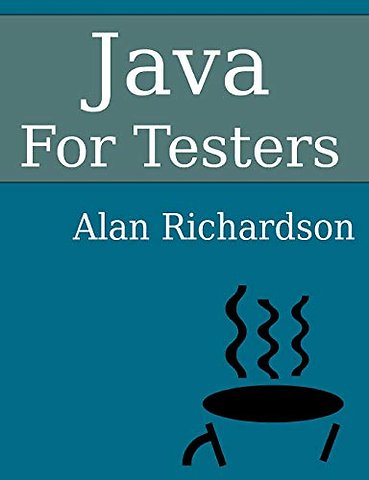


Alan has worked as an Independent Software Testing Consultant in the City of London's Finance Sector, Gaming, Media, TV, Airlines, Utilities, Pharmaceutical and Telecom industries.
Meer over Alan RichardsonJava for Testers
Paperback Engels 2015 1e druk 9780956733252Samenvatting
This book is for people who want to learn Java. Particularly people on a team that want to learn Java, but who aren't going to be coding the main Java application i.e. Testers, Managers, Business Analysts, Front End Developers, Designers, etc.
If you already know Java then this book may not be for you. It is aimed at beginners.
I cover 'just enough' to get people writing tests and abstraction layers, but I don't really go down into a lot of detail. For example, I cover the basics of Inheritance, but don't really cover Interfaces in detail. I explain the concept of Interfaces, because we need to know it to understand Collections, but not how to write them.
Why? Because I want to cover enough to get people started, and working. I don't want to overload them. Once they are on their way, and have gained some experience. Then, when they are ready, they should have the basic knowledge to let them understand the additional concepts.
Why 'for testers'?
- Java Developers coding production applications in Java need to learn Java differently from other people on the team.
- Throughout my career I have written thousands of lines of Java code, but I have rarely had to compile the code into an application. Yet, when we learn Java, one of the first things we learn is 'javac' and the 'main' method.
- Most of the code I write is wrapped up in a JUnit @Test method.
- Everytime I have taught Java to testers or other people on the team, I start with a JUnit @Test method and show them how to run tests from the IDE.
- Testers, and other people on the team use java differently, and I think we need a different order and approach to learning Java.
This is a high level view of the topics the book covers:
- JUnit
- Installing Java, Maven and the IDE
- Classes
- Methods
- Packages
- Comments
- Primitive Types
- Operators
- Constructors
- Code Completion
- AutoBoxing
- Integer, String, Boolean
- Static
- Fields
- Scope of methods and fields
- Naming conventions
- Final
- Escape Sequences
- Selection: if, else, ternary operators, switch
- Iteration: for each, for, break
- Arrays
- Collections
- Inheritance
- Exceptions, including how to create your own
- Random Data
- Dates
- File Handling
- Properties
- Property Files
- BigDecimal
Specificaties
Lezersrecensies
Inhoudsopgave
Introduction
-Testers use Java differently
-Exclusions
-Windows and Mac supported
-Supporting Source Code
-About the Author
-Acknowledgments
Chapter One - Basics of Java Revealed
-Java Example Code
Chapter Two - Install the Necessary Software
-Introduction
-Do you already have JDK or Maven installed?
-Install The Java JDK
-Install Maven
-Install The IDE
-Create a Project using the IDE
-About your new project
-Add JUnit to the pom.xml file
-Summary
Chapter Three - Writing Your First Java Code
-My First JUnit Test
-Prerequisites
-Create A JUnit Test Class
-Create a Method
-Make the method a JUnit test
-Calculate the sum
-Assert the value
-Run the @Test method
-Summary
-References and Recommended Reading
Chapter Four - Work with Other Classes
-Use @Test methods to understand Java
-Warnings about Integer
-Summary
-References and Recommended Reading
Chapter Twenty Three - Next Steps
-Recommended Reading
-Recommended Videos
-Recommended Web Sites
-Next Steps
-References
Appendix - IntelliJ Hints and Tips
-Shortcut Keys
-Code Completion
-Navigating Source Code
-Running a JUnit Test
-Loading Project Source
-Help Menu
-Summary
Hope you enjoyed this Sample
-You can buy Java For Testers
-About The Author
Anderen die dit boek kochten, kochten ook
Rubrieken
- advisering
- algemeen management
- coaching en trainen
- communicatie en media
- economie
- financieel management
- inkoop en logistiek
- internet en social media
- it-management / ict
- juridisch
- leiderschap
- marketing
- mens en maatschappij
- non-profit
- ondernemen
- organisatiekunde
- personal finance
- personeelsmanagement
- persoonlijke effectiviteit
- projectmanagement
- psychologie
- reclame en verkoop
- strategisch management
- verandermanagement
- werk en loopbaan





